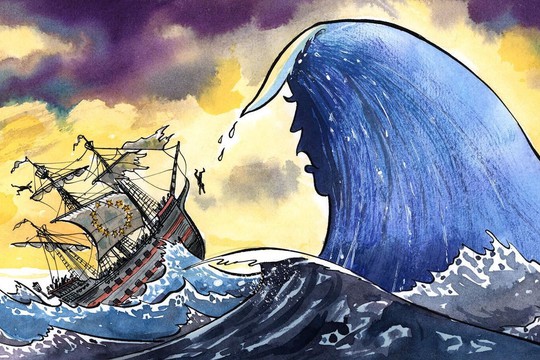Pic. The Economist
The English never liked Europe. Now they are really smearing it! Just read a new commentary in the London “The Economist”.
The crew of a boat whose rudder has fallen off can do little but pray for calm weather and a speedy way to safe harbour. Democracies caught in political gales similarly hope for more placid times as they work out how to chart a new course. Alas, Europe finds itself in the midst of a perfect storm.
Not only is its economy facing stiff headwinds; voters are routinely tossing their leaders overboard, and war on the continent has rocked the boat for three years now. Amid these heavy waters, an even more concerning prospect is focusing minds. A superstorm of uncertain severity — call it the Trumpnado — seems to be headed straight in this rickety craft’s direction. All hands are on deck to try to limit the damage. But the prospects for plain sailing look as distant as ever for the good ship Europe.
Navigators worry most about sailing uncharted waters. But Europe is actually familiar with the treacherous seas that await it come January 20th, when Donald Trump will be sworn in as America’s president. A nativist, America-first president will again fray the links that bind the two main parts of the West, and the international order the Atlantic alliance struggles to uphold.
In 2019 Emmanuel Macron, France’s president (and, like Charlemagne, a fan of metaphors) told The Economist that Europe was teetering on the edge of a precipice, and that NATO was “brain-dead”.
Europe is in far worse shape as it awaits its second dose of Trumpism. Politics are at their most chaotic in years.
Germany is headed to the polls on February 23rd, and will probably dump Chancellor Olaf Scholz — but a new government is unlikely to be in office before late April.
France is facing its deepest political crisis in recent memory. A new government led by François Bayrou may prove longer-lasting than the previous one, which sank after a mere three months, but seems hardly seaworthy.
Poland, another one of the European Union “bigs”, is due to elect a president in May. Should the candidate favoured by Donald Tusk, the liberal prime minister, fail to win, several years of paralysis could ensue.
Belgian politicians are still haggling to form a government more than 200 days after elections were held.
What political strength exists is hardly of the reassuring sort. A slew of hard-right politicians, including Herbert Kickl in Austria and Viktor Orban in Hungary, seem intent on capturing or scuttling the EU. They are being overtly supported by Mr Trump and his acolyte Elon Musk; space has been found for several nationalist European politicians to attend the inauguration in Washington.
In recent years the most stable part of the continent’s political apparatus has been its central institutions in Brussels. But Trumpians hate the supranational Eurocracy. Worse, its figurehead Ursula von der Leyen, the president of the European Commission, has spent the first half of January hobbled by pneumonia, including a discreet stint in hospital.
This is not a good time for Europe to take on foreign adversaries. Yet it now faces three global geopolitical powers at the same time. Russia is the most menacing; China and the EU have been edging towards a trade war; Mr Trump now promises a trade war of his own, along with vague threats against NATO (unless its members spend vastly more on defence) and outlandish provocations towards Greenland. Tech titans who have the ear of the president want him to neuter European regulations on social media.
The mood below Europe’s decks is grim. Europeans are panicked. The EU’s leaders know they need to chart a new common course — but do not yet agree what that might be.
For Mr Macron, what matters is the “strategic autonomy” of Europe, meaning its ability to get stuff done without American support, for example by ensuring the continent develops its own military kit. Others, notably in central Europe, think that is delusional: to them it is clear America will be, for the foreseeable future, indispensable to guaranteeing the continent’s security. Buttering up the maga crowd by buying American jets and missiles is the surest way to show Mr Trump that Europe is a worthy ally.
Mr Trump’s arrival may yet lead to Europeans finally rowing in the same direction.
On February 3rd the EU’s 27 leaders will meet at an informal retreat outside Brussels to discuss defence. The bloc has belatedly agreed that far more needs to be spent on military preparedness. (Sir Keir Starmer, prime minister of a former EU member and former great maritime power, will attend too.) By then the Trumpnado may have struck, or remain just a threat.
Either way the choice facing Europe is simple: Sink or Swim.
read more in our Telegram-channel https://t.me/The_International_Affairs

 10:32 19.01.2025 •
10:32 19.01.2025 •























